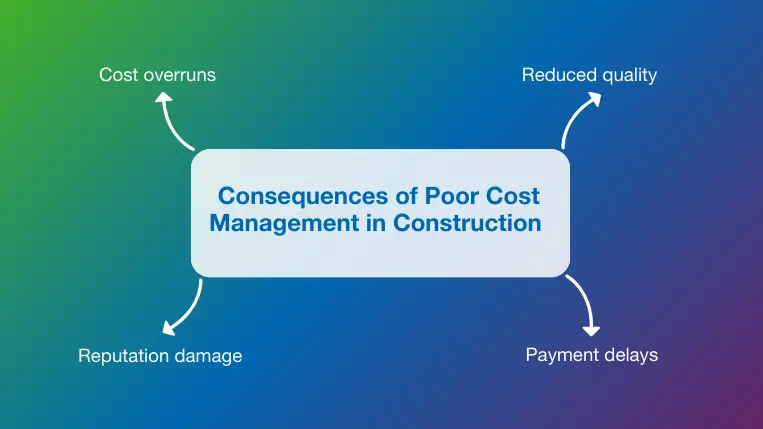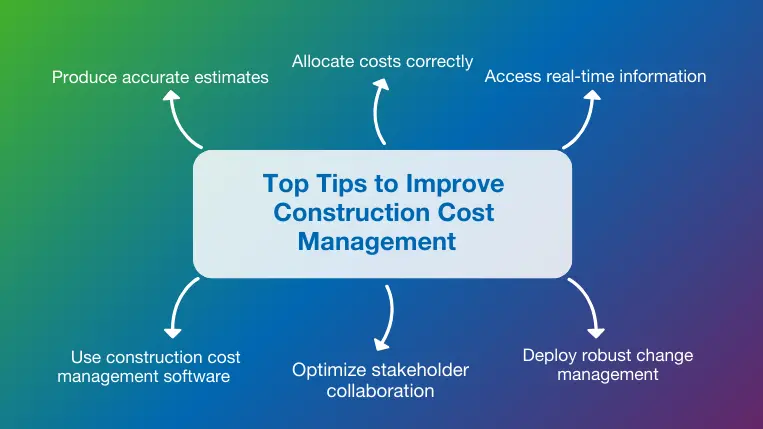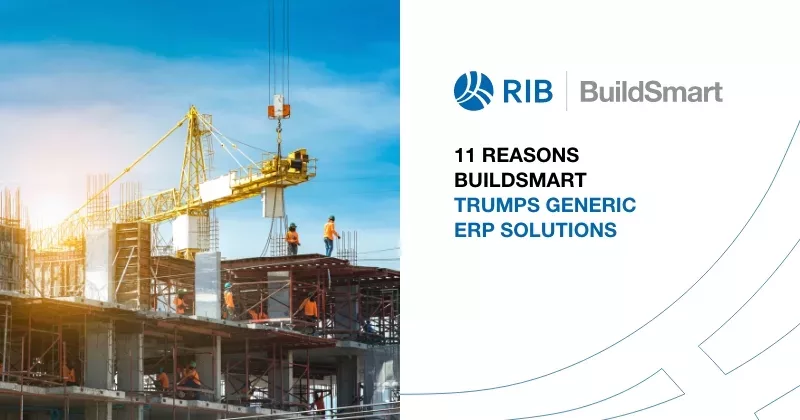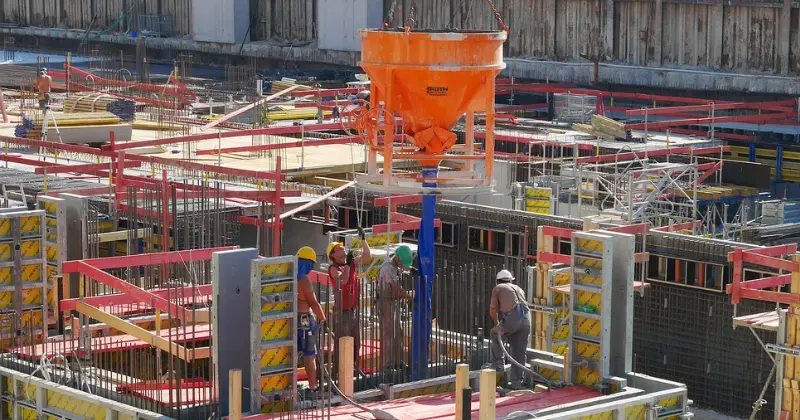11 mins read
Construction Cost Management: Logical Practices to Ensure Project Budget Adherence

Leaders in the construction industry understand the importance of managing costs and keeping expenses under control. Yet, without a centralized approach to construction project cost management, even the best intentions cannot guarantee successful outcomes. Thankfully, well-established practices and advanced software solutions are available to help overcome the challenges.
In this blog post, we examine the definition and importance of cost management in construction projects and review the consequences of poor management practices. We also provide valuable tips to ensure project budgets and expenses stay on track.
What is Construction Cost Management?
Construction cost management refers to the collection of processes used to predict and control costs to ensure projects stay on budget. Keeping expenses within established limits throughout the project lifecycle helps to minimize risks and improve profitability.
Cost management in construction projects begins early in the design, planning, and estimation phases and continues through completion. Along with the financial benefits that come from budget adherence, sound cost management practices also help construction companies to build reputations as responsible and efficient service providers. With over 90% of projects failing to stay within their budget, this can become a differentiating factor in a highly competitive market.
Siloed systems and practices contribute to the cost overruns and budget discrepancies that impact many projects, so collaborative practices using common software platforms continue to evolve as these tools improve.
Who is responsible for construction cost management?
The construction project manager establishes and maintains the overall project budget and timeline, which makes them responsible for cost management as well. Complex programs make the monitoring and control of costs challenging, so project managers often seek additional guidance and assistance from:
- General contractors who supervise and monitor day-to-day activities and coordinate with subcontractors performing specialized tasks.
- Construction procurement managers and buyers managing the flow of materials and equipment used to complete construction projects.
- Clients and project owners who must sign off on change orders and contingencies that can drive costs over the original budget.
In some cases, a dedicated construction cost manager (also known as a quantity surveyor) will be retained to work with contractors, clients, and project managers. These specialists focus exclusively on budget adherence and proactively address any trends that impact financial health. They also seek out opportunities for savings and improved efficiency in all aspects of the operation.
Importance of Creating a Cost Management Plan
A construction cost management plan is a detailed document that explains how project costs are estimated, budgeted, and controlled. The plan creates a baseline for financial performance by allocating costs to each work item and project phase and accurately estimating all direct and indirect project costs. The plan also covers risk-based construction contingencies that are put in place to cover unexpected expenses or delays. The cost management plan becomes an essential project document by:
- Providing a baseline for all expected project costs—including an explanation of how they are calculated—that improves decision-making and understanding
- Minimizing the risk of overruns, delays, and budget non-conformances
- Setting thresholds for corrective actions when budget discrepancies occur
A cost management plan also creates a link between objectives and expenses that helps project managers prioritize spending and cost-cutting activities. This is an extension of the conceptual estimating activities and early design compromises that make projects financially viable.
Consequences of Poor Cost Management in Construction

The best way to explain the benefits of cost management in construction is by reviewing the consequences of poor execution. The impact of mismanagement can extend far beyond the immediate financial repercussions.
Cost overruns
The most obvious consequence of improper construction cost control is the overruns that collectively derail project budgets and lead to dissatisfied clients. While these issues are often associated with direct material, labor, and equipment costs, overruns can also stem from unexpected site conditions, overhead expenses, or scheduling inefficiencies. Inaccurate material and labor estimates early on can also lead to overruns during construction.
Reduced quality
The connection between construction quality and cost management is not always obvious, but a lack of financial responsibility can easily introduce barriers to high quality. Unexpected cost cuts to compensate for overruns can impact material and workmanship quality standards, while inattention to critical equipment maintenance, training, and material handling costs can lead to unnecessary quality and safety risks.
Payment delays
Poor cost management practices can create a ripple effect that eventually leads to cash flow issues with a wide range of consequences. This includes an inability to pay vendors and subcontractors in a timely manner. In extreme cases, these payment delays can eventually lead to legal issues or work stoppages that put the project outcome in jeopardy.
Reputation damage
Client dissatisfaction is the result when poor cost management practices cause delays, overruns, or quality problems. Depending on the contract structure, both the client and contractor may suffer unexpected losses that impact future investments and opportunities. Most importantly, a reputation for mismanaging costs can spread quickly through word-of-mouth and online reviews, making it difficult to attract new projects and partners.
Top 6 Tips to Improve Construction Cost Management

Construction cost management is a complex task that demands unwavering attention to detail and proactive responses to trends and discrepancies. Proven strategies and best practices prevent these budget issues from standing in the way of project success.
1. Produce accurate estimates
The construction cost estimation process is a critical piece of the puzzle for cost management, since it provides a baseline for all future decisions and assessments. Producing detailed estimates for every material, labor, and overhead element can be a time-consuming process, so the construction industry has continued to lean into takeoff and estimating software, like RIB CostX, capable of providing precise results quickly, using either 2D drawings or 3D models as an input.
2. Allocate costs correctly
Perceived overruns and budget discrepancies can sometimes be more damaging than actual issues, since they create a mismatch between the cost and its true source. For example, when administrative expenses related to equipment maintenance and handling are classified as direct equipment expenses, a simple accounting error can be interpreted as a cost overrun. Standardized cost codes help to avoid these issues by providing a filter to accurately classify and allocate all expenses and minimize confusion.
3. Access real-time information
Informed cost management decisions can only be made with the benefit of real-time data from suppliers, contractors, and the field. Timely data related to material costs, labor hours, and other expenses prevents the scope of problems from expanding before it can be analyzed and corrected. Real-time performance data from the field also helps to prevent the overallocation or under-utilization of resources that can inflate expenses while frustrating contractors and subcontractors.
4. Deploy robust change management
No team begins a new project intending to generate an unending stream of change orders, but some amount of design, material, and scope changes are to be expected. Unfortunately, many of these changes also impact project costs in ways that might not have been anticipated. Structured construction change management practices help to mitigate these risks by quickly identifying changes that fall outside of contract terms, documenting changes (and their approvals) thoroughly, and triggering contingencies at the appropriate times.
5. Optimize stakeholder collaboration
Collaboration between key stakeholders is essential for cost management, since cross-functional input is needed to ensure cost and expense data is shared in a timely manner, all changes are documented, and any errors or miscalculations are corrected before they lead to confusion or disputes. Strong communication practices help to minimize the rework, waste, and poor productivity that incrementally weaken financial performance. Professional construction collaboration software improves coordination by establishing a common interface that keeps everyone on the same page.
6. Use construction cost management software
The final, and arguably the most important, tip for effectively managing costs in building projects is to invest in specialized technology. Cost management software, like RIB BuildSmart, is purpose-built to help teams proactively manage expenses. It improves collaboration by consolidating reports and providing access to cost and accounting information from any location at any time. The software also enhances decision-making through real-time analytics and intuitive dashboards that are fully integrated with the entire construction management system. Payroll information and processing are directly linked to contract cost reporting and enterprise accounting functions for a complete financial overview of the project.
Having a centralized location to manage all data and collaborate with others, ensures no decision is made based on intuition but factual information, leading to increased productivity and profitability.
Conclusion
As you learned throughout this post, construction cost management can be the difference between success and failure for complex projects, so all contractors, clients, and vendors must do their part to monitor and control costs effectively. Luckily, this process no longer relies on manual data tracking or infinite spreadsheets. Professional cost management software makes the most important cost data and trends accessible in real-time, giving companies the knowledge and power to make smart financial decisions.
RIB BuildSmart, our professional construction cost management software, becomes a single source of truth for companies as they improve their financial control and insight from the initial estimates all the way to final project closeout. Real-time cost reporting capabilities makes accurate activity-based information available when you need it, helping accelerate decision-making.
If you are looking for a collaborative, agile, data-driven approach to construction cost management, get your free demo for RIB BuildSmart today and join the thousands of companies that trust our solutions to skyrocket their success!

Most Recent
11 mins read
10 mins read
10 mins read
29 mins read
Blog Categories

Ebook











